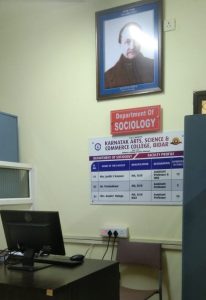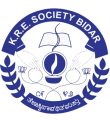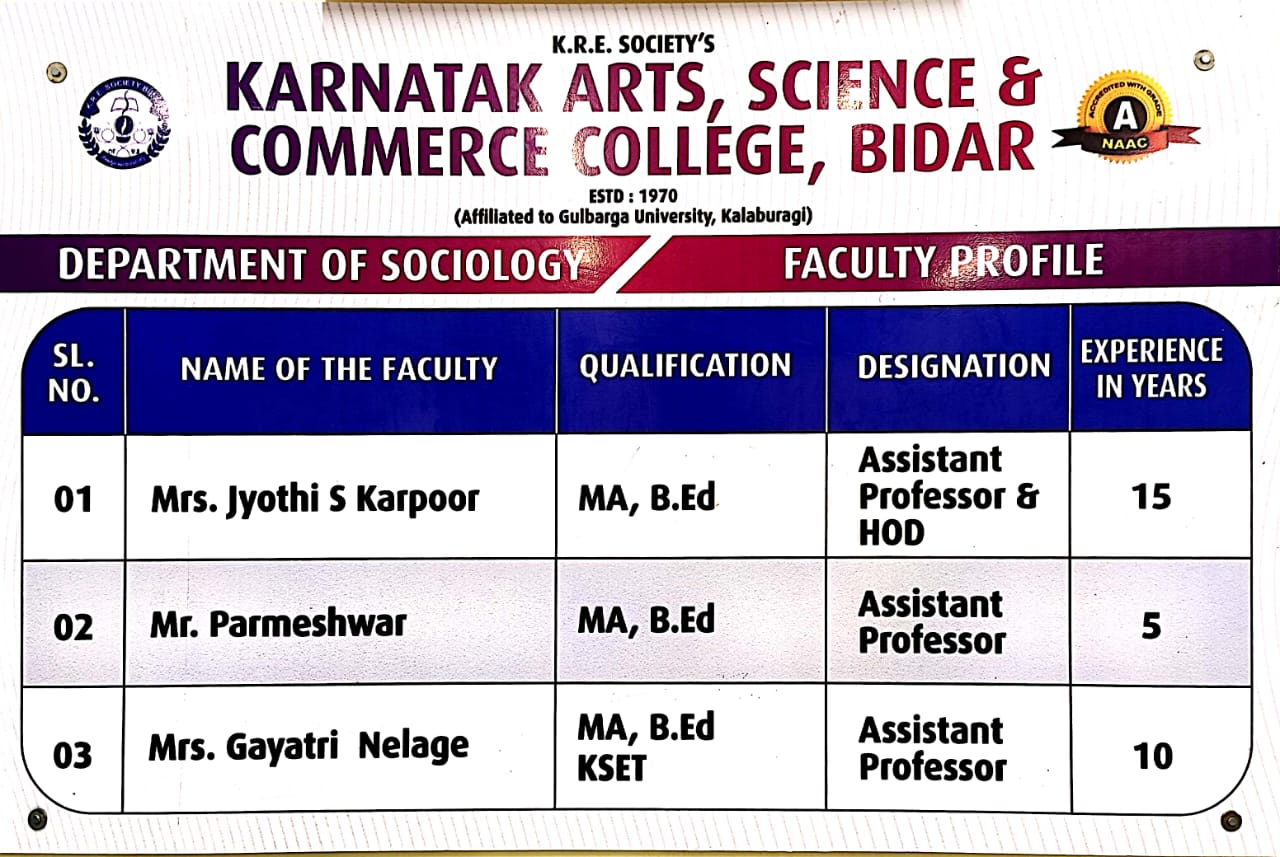Karnataka Rastriya Education Society
- principal@kascc.in.net
- +919343834635
Year of establishment: 1974
The Department of Sociology was established in 1974 with the goal of studying the societal structures, institutions, and inequalities that shape our world. The department seeks to find innovative solutions to social problems and make a real-world impact. Let’s explore further.
Sociologists investigate the structure of groups, organizations, and societies, and how people interact within these contexts. Since all human behavior is social, the subject matter of sociology ranges from the intimate family to the hostile mob; from organized crime to religious cults; from the divisions of race, gender and social class to the shared beliefs of a common culture; and from the sociology of work to the sociology of sports. In fact, few fields have such broad scope and relevance for research, theory, and application of knowledge.

To teach students the concepts, theories, and methods of the behavioral and social services. To introduce students to the basic social processes of society, social institutions and patterns of social behavior. To train students to understand and to interpret objectively the role of social processes, social institutions and social interactions in their lives. To enable students to cope effectively with the socio-cultural and interpersonal processes of a constantly changing complex society.
CBCS
- Sociology, Political Science, Economics
- Sociology ,History , Political Science.
- Sociology, Economics, Statistics
NEP
BA (semester) | Course Credits | Formative Assessment marks | Summative Assessment marks |
DSC I & I I | 3 | 40 | 60 |
Open Elective | 3 | 40 | 60 |
PO1. Subject Knowledge: Graduates should possess a comprehensive understanding of the core subjects within their chosen field of study, which may include subjects like Literature, History, Political Science, Economics, Sociology, Psychology, etc.
PO2. Critical Thinking: Students should be able to analyze, evaluate, and interpret information and ideas critically. They should develop the ability to identify assumptions, recognize biases, and construct well-reasoned arguments.
PO3. Effective Communication: Graduates should be proficient in expressing ideas and concepts clearly and coherently, both in written and verbal forms. They should be able to present their thoughts persuasively and tailor their communication for different audiences.
PO4. Cultural and Global Awareness: Graduates should have an understanding of various cultures, societies, and global issues. This awareness helps them appreciate diversity, adapt to different contexts, and engage in meaningful cross-cultural interactions.
PO5. Ethical and Social Responsibility: Students should develop a sense of ethical responsibility and social consciousness. They should be aware of their role in society, understand social issues, and contribute positively to their communities.
PO6.Interdisciplinary Perspective: Depending on the specialization or electives chosen, graduates should be able to synthesize knowledge from multiple disciplines and apply diverse approaches to problem-solving.
PO7.Adaptability and Lifelong Learning: Graduates should be equipped with the skills to adapt to changing circumstances and continue learning throughout their lives. This could involve learning new technologies, keeping up with evolving trends, and acquiring new knowledge as needed.
PO8.Teamwork and Collaboration: Students should be able to work effectively in teams, understand group dynamics, and contribute constructively to collective efforts. This skill is important for both professional and personal settings.
PO9.Creativity and Innovation: Graduates should foster a creative mindset and be open to innovative ideas. They should be able to think outside the box, propose new solutions, and explore unconventional approaches to challenges.
Final Year Result 2017-2022 (B.A. 6th Sem)
| YEAR | APPEARD | DISTINCTION | FIRST CLASS | SECOND CLASS | PERCENTAGE |
| 2017-18 | 40 | 31 | 06 | 03 | 100 % |
| 2018-19 | 52 | 34 | 04 | 05 | 100% |
| 2019-20 | 53 | 30 | 19 | 04 | 100% |
| 2020-21 | 31 | 25 | 02 | 03 | 98% |
| 2021-22 | 40 | 16 | 11 | 13 | 100% |
| Sl.No | Name of the equipments | Total Number |
| 1 | Computer | 01 |
| 2 | Chair | 02 |
| 3 | Table | 01 |
| 4 | Almara | 01 |
| Total | 06 |
Department of Sociology Conducted Awareness Program on the Topic of Comprehensive Sexuality Education for Adolescents and Young People, Dr. Arti Raghu, Gynocologist & President FPAI Bidar, was the Resource Person For the Program.
Department of Sociology has Celebrated World Population Day on 12th July 2019 and Mr. Srinivas Biradar, Branch Manager FPAI Bidar, was Invited as Chief Guest For the Program.

Visited to Old City Bidar to Bring Awareness about SHG to the Students on 27th July 2022.
Students participated as Volunteers in Population Control Jatha at Astoor Village Conducted by FPAI, Bidar on 26/07/2018
Department of Sociology Conducted Awareness Program on the Topic of Health and Hygien Dr. Lalitamma Gynocologist Bidar, was the Resource Person For the Program.
Poster Presentation by Dept of Sociology in 4th State Level KSTA Conference.







